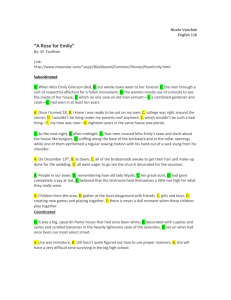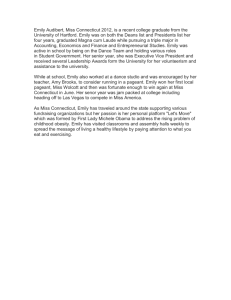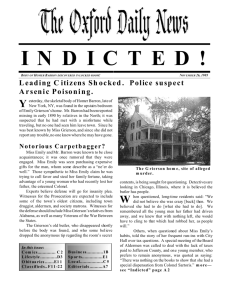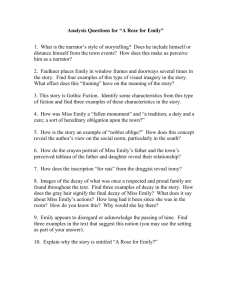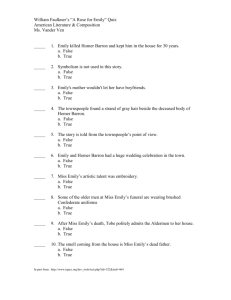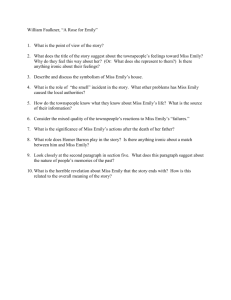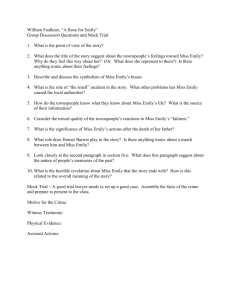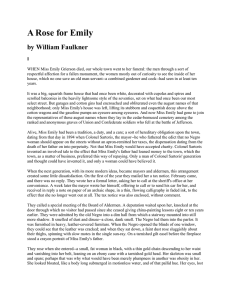Characterizatiion worksheet
advertisement
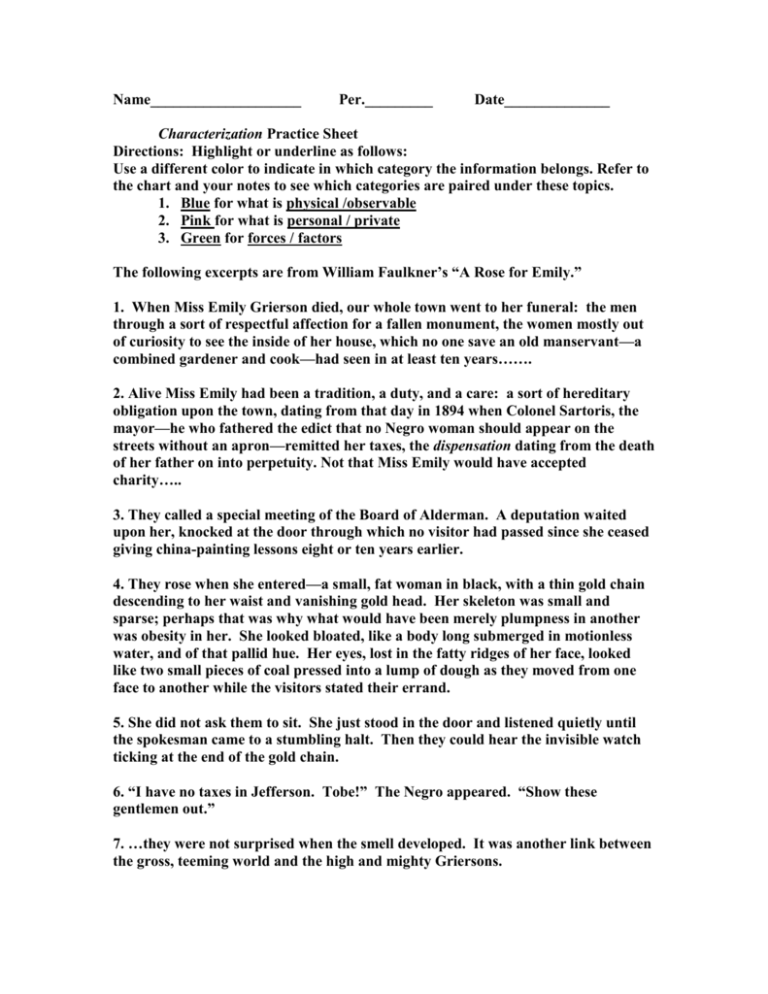
Name____________________ Per._________ Date______________ Characterization Practice Sheet Directions: Highlight or underline as follows: Use a different color to indicate in which category the information belongs. Refer to the chart and your notes to see which categories are paired under these topics. 1. Blue for what is physical /observable 2. Pink for what is personal / private 3. Green for forces / factors The following excerpts are from William Faulkner’s “A Rose for Emily.” 1. When Miss Emily Grierson died, our whole town went to her funeral: the men through a sort of respectful affection for a fallen monument, the women mostly out of curiosity to see the inside of her house, which no one save an old manservant—a combined gardener and cook—had seen in at least ten years……. 2. Alive Miss Emily had been a tradition, a duty, and a care: a sort of hereditary obligation upon the town, dating from that day in 1894 when Colonel Sartoris, the mayor—he who fathered the edict that no Negro woman should appear on the streets without an apron—remitted her taxes, the dispensation dating from the death of her father on into perpetuity. Not that Miss Emily would have accepted charity….. 3. They called a special meeting of the Board of Alderman. A deputation waited upon her, knocked at the door through which no visitor had passed since she ceased giving china-painting lessons eight or ten years earlier. 4. They rose when she entered—a small, fat woman in black, with a thin gold chain descending to her waist and vanishing gold head. Her skeleton was small and sparse; perhaps that was why what would have been merely plumpness in another was obesity in her. She looked bloated, like a body long submerged in motionless water, and of that pallid hue. Her eyes, lost in the fatty ridges of her face, looked like two small pieces of coal pressed into a lump of dough as they moved from one face to another while the visitors stated their errand. 5. She did not ask them to sit. She just stood in the door and listened quietly until the spokesman came to a stumbling halt. Then they could hear the invisible watch ticking at the end of the gold chain. 6. “I have no taxes in Jefferson. Tobe!” The Negro appeared. “Show these gentlemen out.” 7. …they were not surprised when the smell developed. It was another link between the gross, teeming world and the high and mighty Griersons. 8. That was when people had begun to feel really sorry for her. People in our town, remembering how old lady Wyatt, her great-aunt, had gone completely crazy at last, believed that the Griersons held themselves a little too high for what they really were. None of the young men were quite good enough for Miss Emily and such. We had long thought of them as a tableau, Miss Emily a slender figure in white in the background, her father a spraddled silhouette in the foreground, his back to her and clutching a horsewhip, the two of them framed by the back-flung front door. So when she got to be thirty and was still single, we were not pleased exactly, but vindicated; even with insanity in the family she wouldn’t have turned down all of her chances if they had really materialized. 9. The day after his death all the ladies prepared to call at the house and offer condolence and aid, as is our custom. Miss Emily met them at the door, dressed as usual and with no trace of grief on her face. She told them that her father was not dead. She did that for three days, with the ministers calling on her, and the doctors, trying to persuade her to let them dispose of the body. Just as they were about to resort to law and force, she broke down, and they buried her father quickly. 10. She was sick for a long time. When we saw her again, her hair was cut short, making her look like a girl, with a vague resemblance to those angels in colored church windows—sort of tragic and serene. 11. She carried her head high enough—even when we believed that she was fallen. It was as if she demanded more than ever the recognition of her dignity as the last Grierson; as if it had wanted that touch of earthiness to reaffirm her imperviousness. Like when she bought the rat poison, the arsenic. That was over a year after they had begun to say “Poor Emily,” and while the two female cousins were visiting her. 12. I want some poison,” she said to the druggist. She was over thirty then, still a slight woman, though thinner than usual, with cold, haughty black eyes in a face the flesh of which was strained across the temples and about the eye-sockets as you imagine a lighthouse-keeper’s face ought to look. “I want some poison, she said.” 13. Already we knew that there was one room in that region above the stairs which no one had seen in forth years, and which would have to be forced. They waited until Miss Emily was decently in the ground before they opened it…..what was left of him, rotted beneath what was left of the nightshirt, had become inextricable from the bed in which he lay. 14. Then we noticed that in the second pillow was the indentation of a head. One of us lifted something from it and leaning forward, that faint and invisible dust dry and acrid in the nostrils, we saw a long strand of iron-gray hair.
